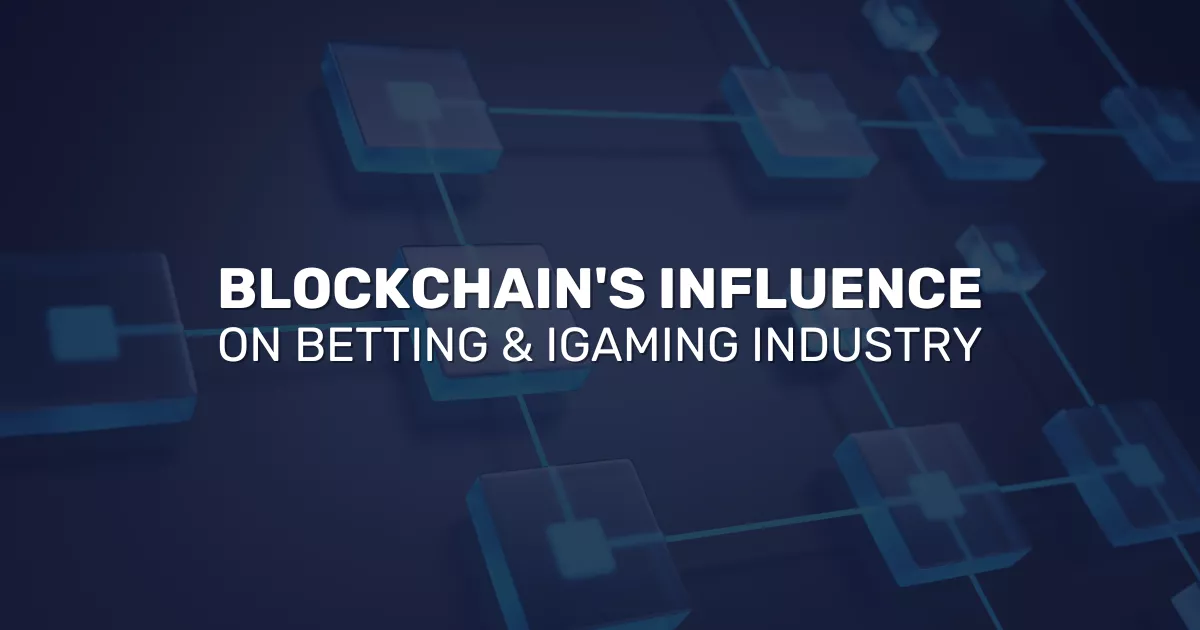Entrevistas y Editoriales
Impacto de la tecnología Blockchain en la industria de apuestas y juegos en línea

- Comprendiendo la mecánica de la tecnología Blockchain
- Llevando transparencia y equidad a la industria de iGaming
- Mejorando la seguridad y el anonimato del usuario
- Revolucionando las transacciones con contratos inteligentes
- Facilitando el cumplimiento regulatorio
- Desafíos para la adopción del blockchain en la industria de iGaming
- El impacto en los operadores tradicionales de iGaming
- Perspectivas futuras y conclusión
La revolución digital ha traído consigo nuevas tecnologías que están transformando de raíz muchas industrias. Una de estas tecnologías disruptivas es el blockchain, un registro digital descentralizado que almacena transacciones en múltiples computadoras de forma que los registros no se pueden modificar retroactivamente. Aunque inicialmente destacó en el sector financiero como la tecnología subyacente del Bitcoin, el impacto del blockchain va mucho más allá. Las industrias de apuestas y juegos en línea (iGaming) son algunas de las que más pueden beneficiarse con la incorporación de esta tecnología. Veamos cómo.
Comprendiendo la mecánica de la tecnología Blockchain #

En el contexto de las apuestas y el iGaming, la tecnología blockchain funciona al registrar cada transacción—ya sea una apuesta, el resultado de un juego o un pago—como un bloque en la cadena. Estos bloques están interconectados para formar una cadena transparente e ininterrumpida de transacciones que cualquier participante en la red puede verificar. La cadena no está controlada por una sola entidad, sino por una red de nodos (computadoras), cada uno con una copia del blockchain. Esta descentralización hace que la tecnología sea resistente a fraudes, asegurando que, una vez que se registra el resultado de un juego, no pueda ser alterado ni eliminado.
La seguridad única que proporciona el blockchain se debe a su uso de técnicas criptográficas. Cada nuevo bloque en la cadena tiene su propia firma digital o hash. Si alguien intenta modificar la información en un bloque, el hash cambia, alertando a la red de la discrepancia. Este sistema de seguridad evita manipulaciones y mantiene la integridad de la cadena. Comprender estos principios es clave para entender cómo el blockchain, con su estructura basada en la descentralización, transparencia y seguridad, puede resolver muchos problemas que enfrentan las plataformas tradicionales.
Llevando transparencia y equidad a la industria de iGaming #
Uno de los mayores beneficios del blockchain en la industria de iGaming y apuestas es el aumento en el nivel de equidad y transparencia que ofrece. Las plataformas de juegos en línea tradicionales requieren un cierto nivel de confianza de parte de los jugadores, quienes deben creer que los resultados de los juegos no están manipulados. Esta exigencia, desafortunadamente, puede generar desconfianza si el jugador percibe que pierde continuamente.
El blockchain aborda este problema mediante la implementación de un sistema "demostrablemente justo". Este sistema utiliza funciones hash criptográficas para asegurar que ni el jugador ni la casa puedan alterar el resultado de un juego una vez iniciado. Cada parte puede verificar la equidad del juego. A través de esta tecnología, el blockchain genera confianza en los jugadores, asegurándoles que no están siendo engañados.
Mejorando la seguridad y el anonimato del usuario #

La seguridad sigue siendo fundamental en la industria de apuestas y iGaming, dadas las transacciones financieras sustanciales que se manejan. Las bases de datos centralizadas tradicionales son susceptibles a ataques de hackers, lo que puede resultar en filtraciones de datos y pérdidas financieras importantes.
Al adoptar un enfoque descentralizado, el blockchain refuerza la seguridad de las transacciones. La descentralización asegura que los datos no estén almacenados en una sola ubicación, dificultando en gran medida cualquier intento de hackeo. Esta inmutabilidad y seguridad del blockchain lo convierten en una herramienta excelente para mitigar riesgos de seguridad en el sector de iGaming.
Además, esta tecnología también ofrece mayor anonimato al usuario, una característica especialmente atractiva en regiones donde las apuestas y juegos en línea están regulados o son ilegales. Las plataformas tradicionales de apuestas requieren que los jugadores compartan sus datos personales y financieros, lo que puede desalentar a los usuarios por preocupaciones de privacidad. Con el blockchain, la única información necesaria para realizar una transacción es la dirección de la cartera digital del emisor y del receptor.
Revolucionando las transacciones con contratos inteligentes #
La aplicación de contratos inteligentes puede revolucionar la industria de apuestas y iGaming al asegurar transacciones más rápidas y eficientes. Los contratos inteligentes son contratos automatizados que se ejecutan automáticamente cuando se cumplen ciertas condiciones. Estos pueden automatizar el proceso de pagos, eliminando la necesidad de aprobación manual, que suele causar retrasos.
Las plataformas de apuestas basadas en blockchain pueden utilizar contratos inteligentes para facilitar pagos instantáneos en cuanto se determina el resultado de un juego. Esta función de pago automático elimina los problemas de confianza asociados con plataformas donde los jugadores deben depender de que la plataforma libere sus ganancias.
El papel de las criptomonedas #

Más allá de los contratos inteligentes, el uso de criptomonedas en plataformas de iGaming basadas en blockchain también transforma la experiencia del usuario. Cada criptomoneda tiene sus ventajas y desventajas. Bitcoin es ampliamente reconocida y aceptada, pero puede tener velocidades de transacción más lentas que otras, como Ethereum, que ofrece mayor funcionalidad aunque puede ser menos conocida.
Las criptomonedas brindan cierto anonimato, ya que las transacciones son rastreables en la cadena de bloques, pero las partes involucradas permanecen en seudónimos. Esto aumenta la privacidad, aunque complica el cumplimiento de normativas diseñadas para prevenir actividades ilegales como el lavado de dinero.
Además, las criptomonedas permiten micro-transacciones, una ventaja considerable sobre las monedas tradicionales. Con monedas fiduciarias, las tarifas de transacción o límites mínimos pueden hacer que las apuestas pequeñas sean complicadas. Las criptomonedas resuelven este problema al permitir transacciones menores que no serían posibles con monedas tradicionales, haciendo las apuestas más accesibles a una audiencia más amplia.
Facilitando el cumplimiento regulatorio #
En el entorno tradicional de iGaming, el cumplimiento regulatorio puede ser un proceso engorroso. Las autoridades deben asegurarse de que los operadores sigan las reglas y regulaciones para prevenir actividades ilegales como el juego de menores y el lavado de dinero. Sin embargo, rastrear y verificar transacciones de manera manual es una tarea compleja y que requiere tiempo.
La tecnología blockchain, con su naturaleza inmutable y transparente, puede simplificar el proceso de asegurar el cumplimiento regulatorio. Al proporcionar un registro completo y transparente de todas las transacciones, el blockchain puede ayudar a detectar y prevenir actividades ilegales. Para los organismos reguladores y de licencias en la industria de iGaming, podría convertirse en una herramienta invaluable.
Asimismo, la adopción del blockchain podría eventualmente llevar al desarrollo de un estándar universal para la industria de iGaming, lo cual podría armonizar el panorama regulatorio y facilitar a los operadores navegar las normativas dispares de diferentes regiones.
Desafíos para la adopción del blockchain en la industria de iGaming #

Aunque los beneficios del blockchain en la industria de apuestas e iGaming son evidentes, su implementación no está libre de desafíos. La complejidad de la tecnología, combinada con la incertidumbre regulatoria, problemas de escalabilidad y la naturaleza volátil de las criptomonedas, representa obstáculos significativos a superar.
Complejidad y falta de comprensión #
El blockchain es una tecnología compleja, y su comprensión no está muy extendida. Para muchos jugadores y operadores en la industria de iGaming, la tecnología puede parecer intimidante. Esta falta de entendimiento puede ser una barrera para la adopción. Para superarla, los interesados en la industria deben invertir en iniciativas de educación y concientización que desmitifiquen la tecnología y sus beneficios.
Incertidumbre regulatoria #
El blockchain es relativamente nuevo, y las regulaciones que lo gobiernan no son uniformes en diferentes jurisdicciones. Los organismos regulatorios de todo el mundo están intentando determinar la mejor forma de regular el blockchain y las criptomonedas. Esta incertidumbre regulatoria puede dificultar la adopción del blockchain por parte de los operadores de iGaming.
Además, en regiones donde el juego en línea está restringido o prohibido, el anonimato que permite el blockchain puede ser una espada de doble filo. Si bien permite a los jugadores eludir restricciones, también puede causar problemas regulatorios, obstaculizando la adopción generalizada de blockchain en la industria de iGaming.
Problemas de escalabilidad #
Aunque el blockchain ofrece muchos beneficios, actualmente enfrenta problemas de escalabilidad. Bitcoin, la blockchain más grande y popular, solo puede procesar un número limitado de transacciones por segundo. Esta limitación es considerablemente menor en comparación con las redes de pago tradicionales. A medida que la industria de iGaming continúa creciendo, esta limitación de escalabilidad podría convertirse en un obstáculo significativo.
Volatilidad de las criptomonedas #
El uso de criptomonedas para transacciones es una parte integral de la tecnología blockchain. Sin embargo, la extrema volatilidad de las criptomonedas puede ser un impedimento para los jugadores. Las ganancias de un jugador podrían disminuir en valor antes de que tengan la oportunidad de retirarlas, debido a las fluctuaciones de valor de las criptomonedas. Esta volatilidad puede desalentar a los jugadores de adoptar plataformas basadas en blockchain.
El impacto en los operadores tradicionales de iGaming #
El auge de las plataformas basadas en blockchain está alterando el panorama y los modelos de negocio de la industria de iGaming. A medida que esta tendencia avanza, los operadores de iGaming tradicionales deben tomar decisiones estratégicas. Algunas empresas han optado por integrar el blockchain en sus infraestructuras existentes, mientras que otras están evaluando el impacto de este cambio en su posición competitiva.
Los operadores que han integrado el blockchain lo hacen para capitalizar los beneficios potenciales que ofrece, como mayor seguridad, mejor transparencia y posiblemente una mayor confianza del usuario. Su objetivo es optimizar sus operaciones utilizando esta tecnología revolucionaria.
Los operadores que aún no han implementado blockchain están evaluando su posición ante la aparición de competidores completamente basados en blockchain. Estos nuevos actores pueden ofrecer un entorno de juego más transparente y seguro. Las estrategias de los operadores tradicionales deben reconsiderarse para mantener su posición en el mercado, ya sea considerando la adopción del blockchain o explorando métodos alternativos para igualar la oferta de estas plataformas innovadoras.
Perspectivas futuras y conclusión #
Si bien la tecnología blockchain trae posibilidades emocionantes para las industrias de apuestas y iGaming, es importante considerar los desafíos y limitaciones que podría enfrentar en su camino hacia una adopción generalizada. Aunque los beneficios del blockchain, como mayor transparencia, equidad, seguridad y eficiencia, son prometedores, estos deben equilibrarse con desafíos como la incertidumbre regulatoria, la complejidad tecnológica y la volatilidad de las criptomonedas.
Ciertamente, los operadores que logren integrar el blockchain en sus plataformas pueden estar bien posicionados para capitalizar estos beneficios y ganar una ventaja competitiva. Plataformas basadas en blockchain, como Augur, muestran cómo podría ser una experiencia de juego más segura, justa y transparente.
Sin embargo, la aplicación generalizada del blockchain en la industria de iGaming requiere un esfuerzo conjunto de todas las partes interesadas. Los organismos reguladores necesitan afrontar el reto de formar normativas que apoyen el uso del blockchain. Los proveedores de plataformas y operadores deben estar dispuestos a adentrarse en las complejidades de esta tecnología e invertir significativamente en educación del usuario, promoviendo un claro entendimiento de cómo funciona el blockchain y sus beneficios. La disposición de los jugadores para adoptar estas nuevas plataformas también desempeñará un papel fundamental en el éxito de la adopción del blockchain.
En conclusión, la integración del blockchain representa una posible pero compleja vía de transformación en las industrias de apuestas y iGaming. La promesa del blockchain de abordar problemas históricos del sector—como la equidad, la transparencia, la seguridad y la eficiencia—es atractiva, pero el camino hacia su adopción no está libre de obstáculos. Estos desafíos no deben pasarse por alto mientras la industria se acerca a lo que podría ser una nueva era de iGaming impulsada por el blockchain y un nuevo capítulo en la historia de las apuestas. En este entorno en constante evolución, navegar con prudencia e información es clave.
In conclusion, the integration of blockchain technology represents a potential, but complex, avenue for transformation within the betting and iGaming industries. The blockchain's promise to address long standing industry issues—such as fairness, transparency, security, and efficiency—is compelling, but the road to adoption is not without challenges. These hurdles should not be overlooked as the industry approaches what could be a new era of blockchain-powered iGaming and a new chapter in betting history In this rapidly evolving landscape, careful, informed navigation is key.
Tags:
Artículos Relacionados
Entrevistas y Editoriales
03.05.2024.
Los Eventos de Apuestas Más Populares del Mundo
Echa un vistazo a nuestro resumen de los principales eventos de apuestas globales, incluidos el Mundial de la FIFA, el Super Bowl y más, ofreciéndote información sobre cuándo y dónde se realizan las apuestas más importantes.
Aprender más
Entrevistas y Editoriales
22.02.2024.
Guía Interna de RTP: ¡Todo lo que Necesitas Saber para Dominar la Economía de las Apuestas!
Descubre qué significa RTP (Retorno al Jugador), por qué es crucial para la participación de los jugadores y el éxito de los operadores, y cómo entenderlo puede transformar la estrategia de tu negocio.
Aprender más
Entrevistas y Editoriales
12.12.2023.
10 Tácticas Comprobadas para Triunfar en la Industria de Apuestas
Descubre las diez mejores estrategias para el éxito en apuestas e iGaming. Desde plataformas integradas innovadoras hasta insights en retail impulsados por IA, este blog revela cómo sobresalir en el dinámico mundo de las apuestas.
Aprender más
¿No encontraste lo que buscabas?
Nuestro equipo estará encantado de guiarte a través de nuestros productos y servicios.
Contáctanos